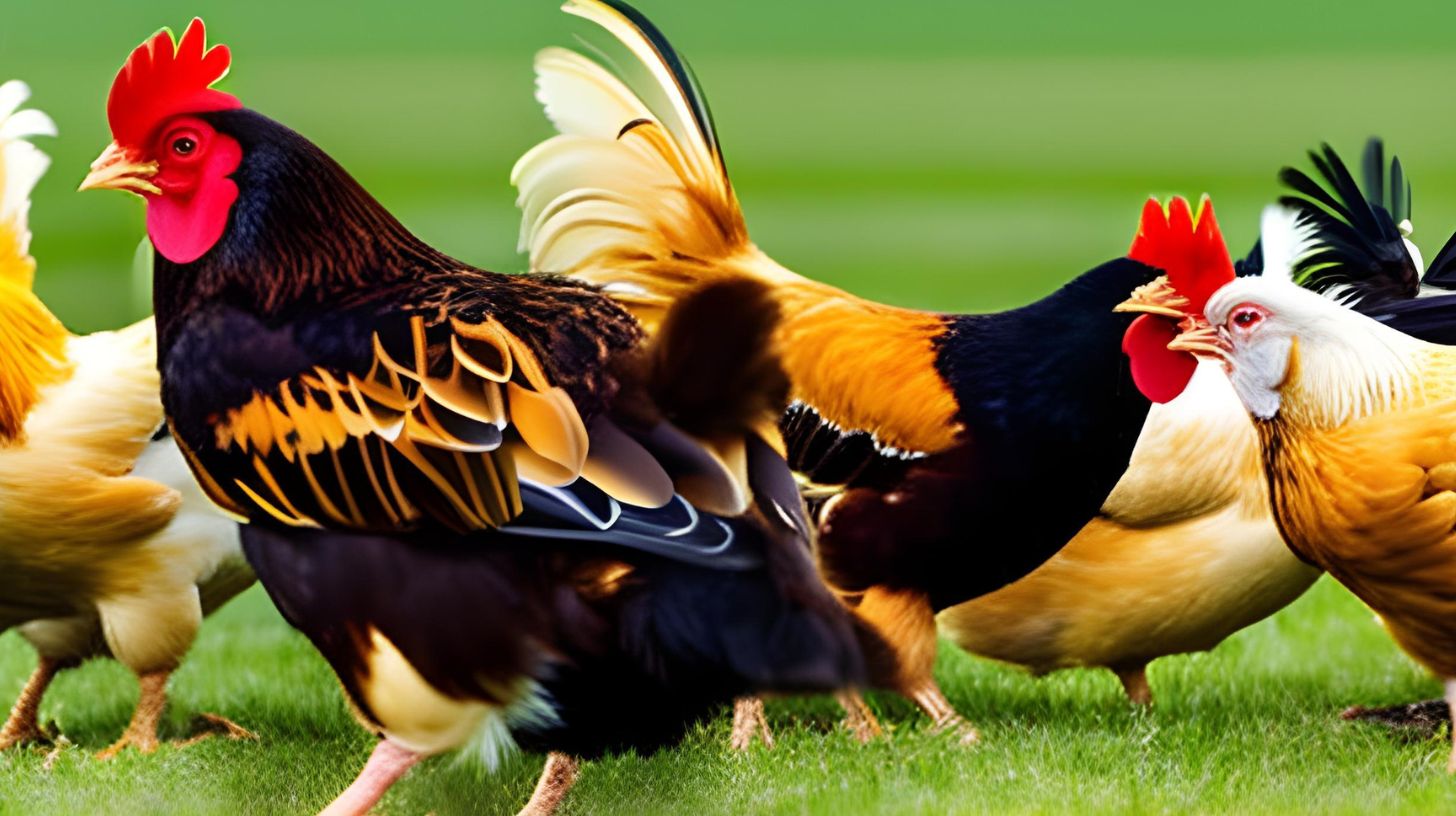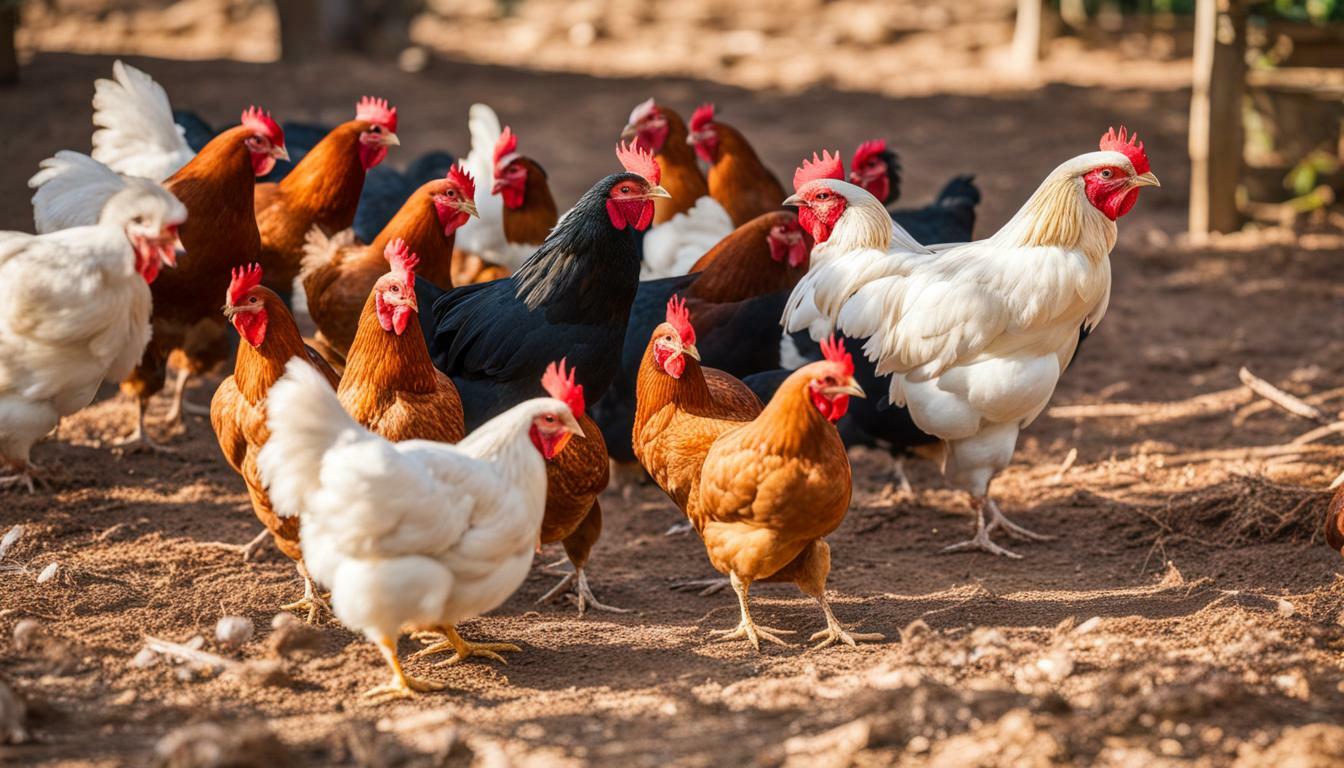Can Chickens Eat Spinach?
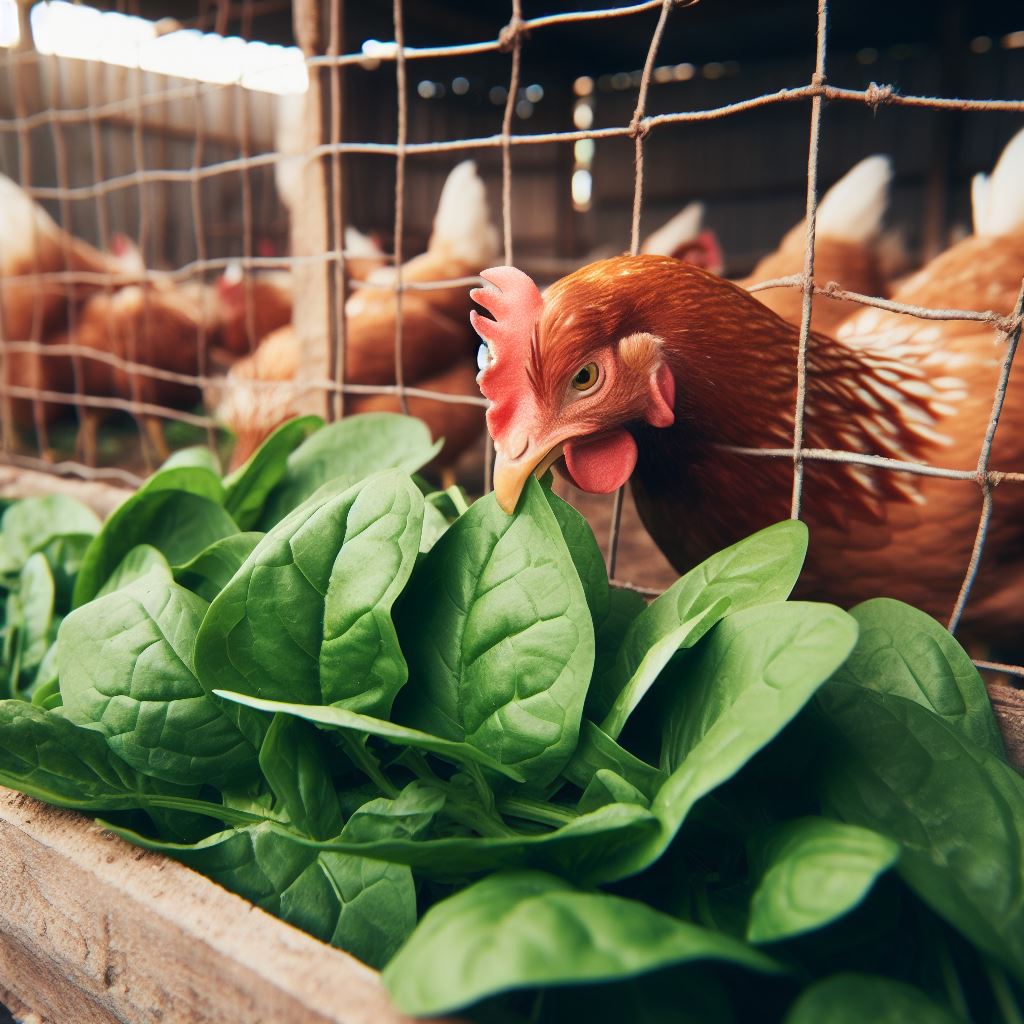
Table of content:
Spinach is a leafy green vegetable that is packed with nutrients. As a chicken owner, you may wonder if you can share some of your spinach with your flock. The answer is yes, chickens can eat spinach in moderation as part of a balanced diet.
Benefits of Feeding Spinach to Chickens
Spinach provides many health benefits for chickens:
- High in vitamins and minerals: Spinach contains vitamins A, C, K, folate, and minerals like iron, calcium, and potassium. These nutrients support immune function, bone health, vision, and more in chickens.
- Contains antioxidants: Spinach is high in antioxidants like lutein, beta-carotene, and quercetin. Antioxidants can boost immunity and health in chickens.
- Omega-3 fatty acids: There is a small amount of omega-3s in spinach that can contribute to skin and feather health.
- Provides moisture: The high water content in spinach can help chickens stay hydrated. This is especially helpful in hot weather.
So in moderation, spinach can provide valuable nutrition for chickens as part of a varied diet.
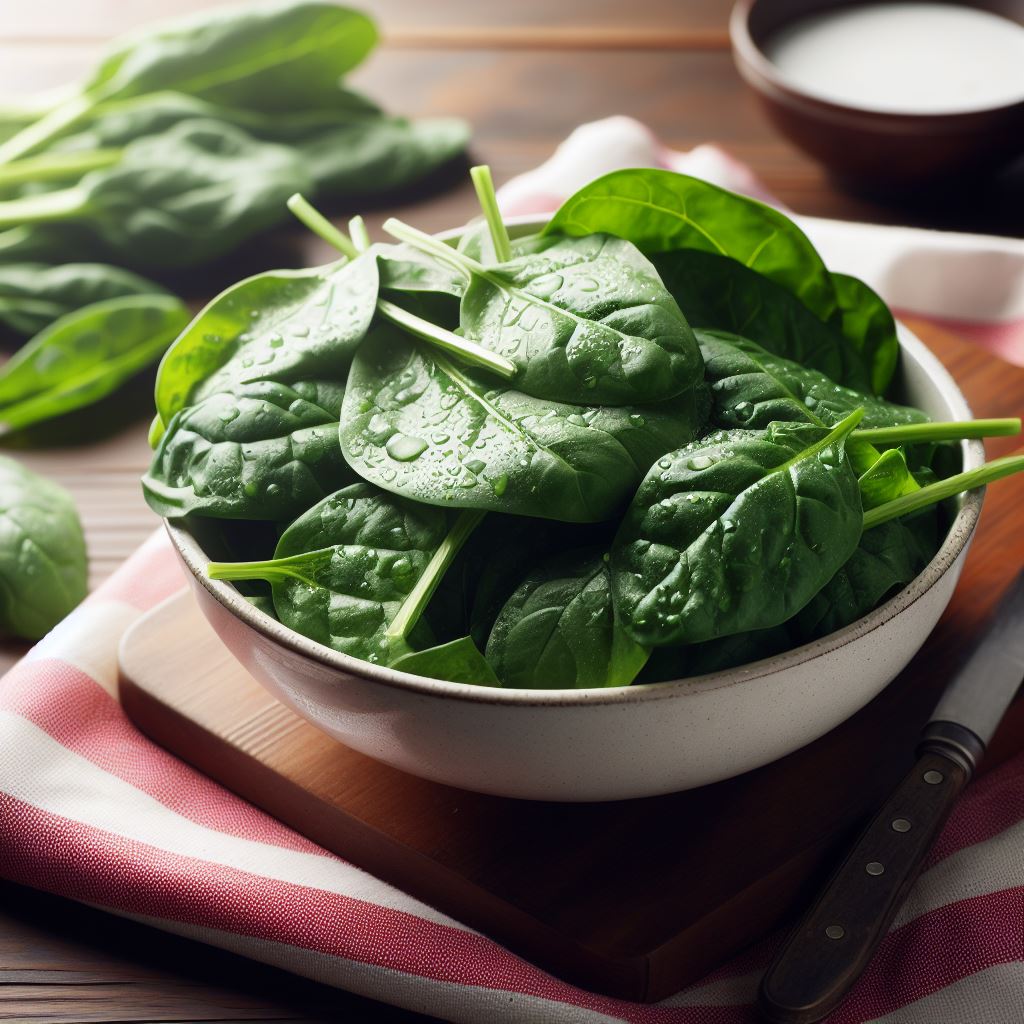 How Much Spinach Can Chickens Eat?
How Much Spinach Can Chickens Eat?
When feeding spinach to chickens, moderation is key. Here are some guidelines on how much to feed:
- For adult chickens, feed 1-2 handfuls of fresh spinach per chicken, 2-3 times per week.
- Limit spinach to no more than 5-10% of the total diet. Too much can cause loose droppings.
- Chicks should not eat spinach – wait until 16-20 weeks old. Their digestive systems cannot handle the oxalic acid.
- Avoid feeding spinach daily or in large quantities. The oxalic acid content can bind calcium and cause nutritional imbalances.
Following these portions will allow chickens to benefit from the nutrition in spinach without risks. Monitor your chickens and adjust amounts accordingly if they show signs of digestive upset.
Feeding Spinach to Chickens
Here are some tips for offering spinach to your flock successfully:
- Wash spinach thoroughly to remove any dirt, chemicals, or contaminants. Pat dry before feeding.
- Chop or tear spinach into bite-sized pieces so it is easy for chickens to eat.
- Mix with other vegetables like kale, Swiss chard, or carrots for variety.
- Combine with grains like rice, oats, or baked treats to make a balanced meal.
- Offer spinach fresh – chickens may not eat spinach if wilted. Remove any uneaten fresh spinach within a few hours.
- Have a designated feeding area – this prevents chickens from scratching up your garden if you are providing garden spinach.
Follow these tips routinely to give your chickens a diverse diet and the benefits of spinach. Monitor for any digestive issues and adjust serving sizes accordingly.
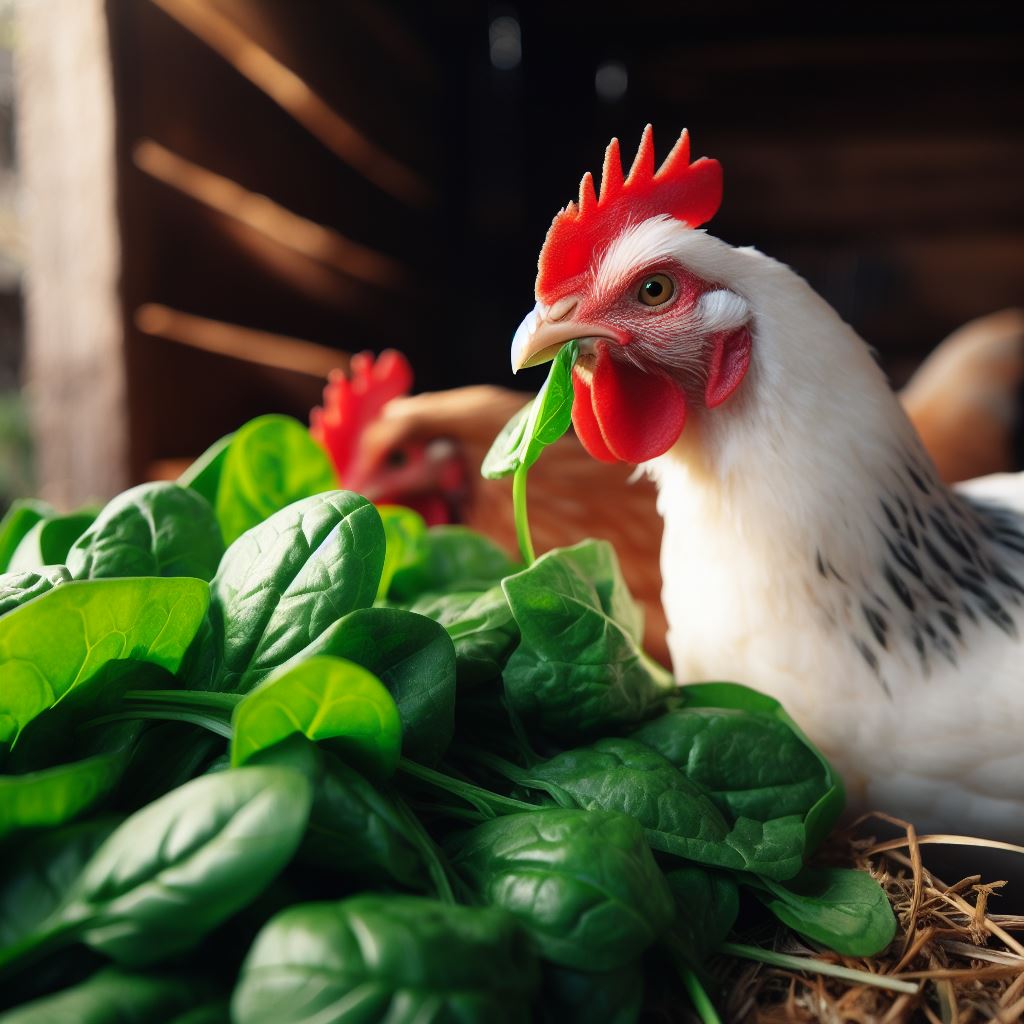 Can Chickens Eat Raw and Cooked Spinach?
Can Chickens Eat Raw and Cooked Spinach?
Chickens can eat spinach raw in its fresh form. Some owners also opt to cook spinach before feeding it. Here is how raw vs. cooked spinach for chickens compares:
| Raw Spinach | Cooked Spinach |
|---|---|
| Provides more vitamin C and folate | Heat reduces some vitamin/nutrient content |
| Natural texture and taste | Can wilt and soften texture |
| Quick and easy to prepare | Requires extra cooking time |
| Higher oxalic acid content | Cooking helps reduce oxalic acid |
| Higher risk of bacteria without cooking | Safer option for chicks under 16 weeks |
| Slightly harder to digest | May be easier on sensitive digestive systems |
Both raw and cooked spinach can be fed to adult chickens in moderation. Cooked spinach may be the better choice for chicks under 16 weeks since their digestive systems are more sensitive.
If cooking spinach for chickens, avoid using seasoning or salt. Steam or boil briefly until just wilted. Let cool before feeding.
Ideal Veggie Alternatives to Spinach
While spinach can be included in a chicken’s diet occasionally, these vegetables make healthier, more frequent choices:
- Kale: Extremely high in vitamins A, C, K, antioxidants, and calcium. Curly kale is best.
- Swiss Chard: Full of vitamins K, A, C, antioxidants. Can feed stems and leaves.
- Broccoli and Cauliflower: Great source of vitamins C and K. Offer florets and chopped stems.
- Carrots: Provide vitamin A and beta-carotene for eye health and immunity.
- Winter Squash: Rich in vitamins A and C, plus potassium and fiber. Try pumpkin, butternut squash, acorn squash.
These vegetables can be fed 2-3 times per week. Rotate selections to provide a diverse nutrient profile. Avoid high-oxalate greens like spinach daily.
Dangers of Feeding Too Much Spinach
While spinach provides benefits in moderation, too much can be detrimental. Here are the risks of overfeeding spinach:
- Nutritional deficiencies: Excess oxalic acid binds calcium and iron, leading to deficiencies over time. This causes issues like thin eggshells.
- Digestive problems: Too much spinach can irritate the digestive tract, causing loose droppings or diarrhea.
- Reduced appetite: Chickens filled up on spinach may eat less of their layer feed, which provides a balanced diet.
To avoid these problems, stick to the recommended serving sizes of 1-2 handfuls, 2-3 times per week at maximum. Do not replace layer feed with spinach or other veggies.
Step-by-Step Guide to Feeding Spinach
Follow these steps for successfully offering spinach to your flock:
Step 1: Pick and Wash Spinach
Select fresh, crisp spinach with vibrant green leaves. Wash thoroughly under cool running water. Check for bugs or dirt and remove any damaged leaves.
Step 2: Chop Spinach
Chop washed spinach into small, bite-sized pieces. This makes it easier for chickens to eat.
Step 3: Prepare Feeding Area
Designate a contained space for feeding spinach. This prevents chickens from trampling garden spinach.
Step 4: Mix with Flock Food
For balanced nutrition, mix chopped spinach with grains, layer feed, treats, or other veggies.
Step 5: Feed in Moderation
Offer adult chickens 1-2 handfuls per chicken 2-3 times weekly at most. Remove uneaten greens within a few hours.
Step 6: Monitor Chickens
Keep an eye on chickens after feeding spinach. Adjust amounts if any chickens get loose droppings.
Following this easy 6 step process will allow you to safely incorporate spinach into your chickens’ diets. Be sure to feed a wide variety of veggies for optimal nutrition.
Frequently Asked Questions
Can spinach make chickens sick?
Too much spinach can cause digestive upset in chickens. Feed only 1-2 handfuls per chicken, 2-3 times weekly at most. Stop feeding spinach if chickens develop diarrhea.
Is spinach high in calcium for chickens?
No, spinach contains oxalic acid which binds calcium, making it unavailable for absorption. Chickens should get calcium from sources like oyster shells.
Is raw or cooked spinach better?
Both are fine for adult chickens. Raw has more nutrients while cooking reduces oxalic acid. Cooked is safer for chicks under 16 weeks old.
Can you feed spinach stems?
Yes, chickens can eat all parts of spinach, including stems and leaves. Chop into bite-size pieces before feeding.
Can chickens eat spinach everyday?
No, spinach should only be an occasional treat. Feed a maximum of 2-3 times per week, due to the oxalic acid content.
Conclusion
Spinach can be a nutritious occasional treat for chickens. It provides vitamins, minerals, and antioxidants that support chicken health. However, moderation is crucial, due to the oxalic acid binding nutrients like calcium.
Feed only 1-2 handfuls per chicken, 2-3 times weekly at most. Avoid overfeeding, and discontinue use if chickens develop diarrhea or other digestive issues.
Overall, spinach can add valuable variety to your chickens’ diets when included sparingly. Be sure to provide layer feed and a diverse range of vegetables for optimal nutrition.
Welcome. I’m Adreena Shanum, the proud owner of this website, and I am incredibly passionate about animals, especially poultry. I founded adreenapets.com as a labor of love, stemming from my desire to share my knowledge and experiences with poultry enthusiasts worldwide.


